Smart Sustainability: Many Businesses Recoup Over Half of Return Costs with Reverse Logistics Strategies
Retail small and midsize businesses (SMBs) are currently navigating a unique challenge: rising return rates, coupled with the need to prioritize eco-friendly business practices to meet customer expectations. Small changes in policies, technology adoption, and partnerships can go a long way in achieving these dual objectives and can even help you recover revenue losses from returns.
Software Advice’s 2023 Retail Returns and Sustainability Strategies survey* finds that 93% of SMB retailers prioritize sustainability when managing customer returns, and 57% make it a high priority. By integrating sustainable practices into your reverse logistics strategy, not only can you reduce the environmental footprint of your business but can also recoup losses from the returned products.
Key findings
Customer satisfaction and sustainability efforts improve with effective returns management: SMB retailers reporting improved sustainability efforts increased by 54% from 2022, and customer satisfaction nearly doubled.
Sustainable logistics and strategic partnerships grow in popularity: Nearly 3 out of 5 respondents report approaching logistics in environmentally-friendly ways. And there’s an 18% jump in retailers working with third-parties to manage returned goods sustainably from 2022.
But greenwashing is prevalent: 63% of respondents agree that the public communications about sustainability don't accurately reflect their actual practices.
Recovery efforts can recoup the majority of costs from returned products: Recycling, repackaging, and repair/refurbishment are the top actions taken. With these tactics, 35% of surveyed retailers report they can recover over half of a returned product’s cost.
Key context
As SMB retailers see higher rates of returned items, managing the reverse logistics process sustainably and effectively becomes even more crucial.
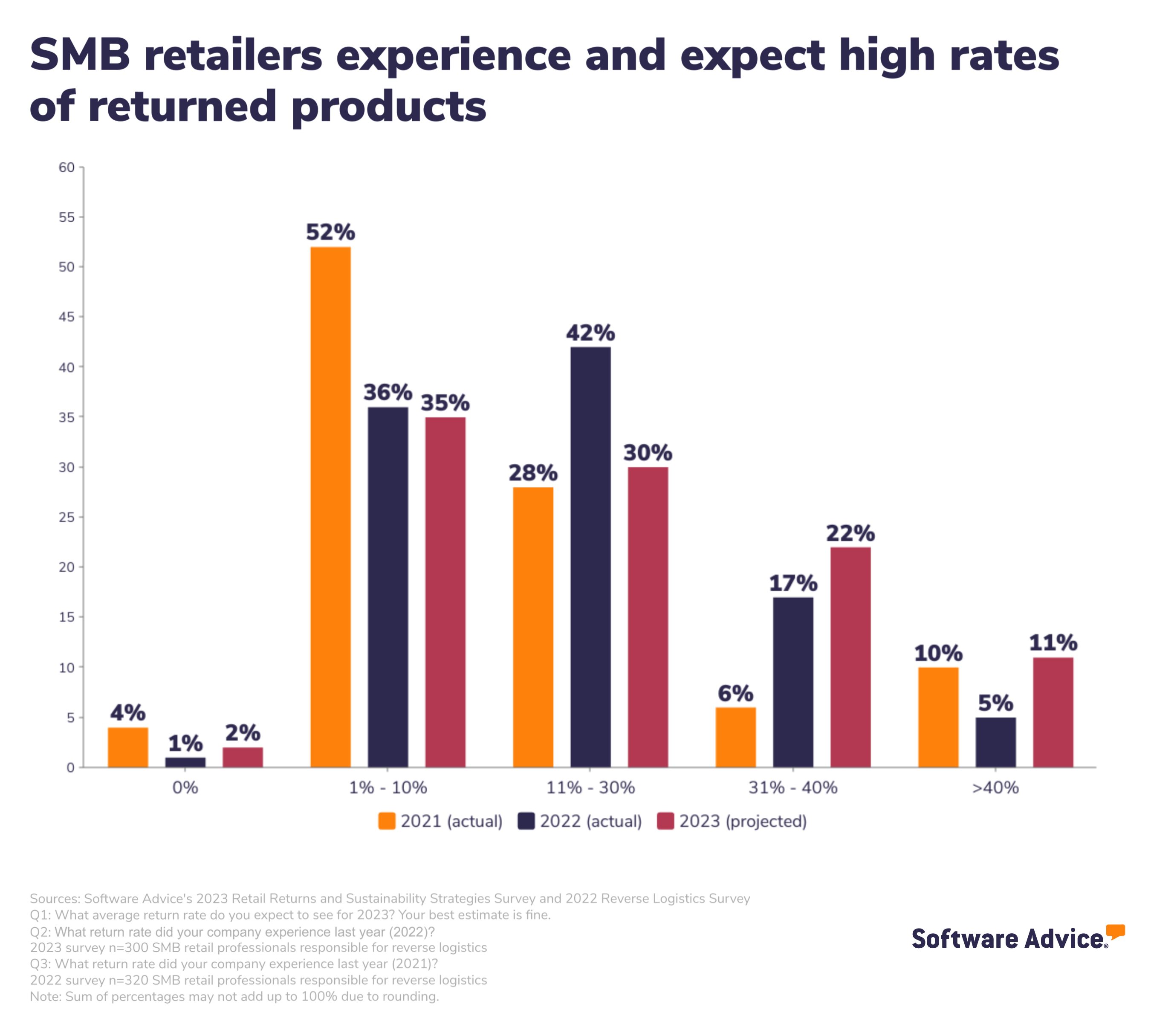
What is reverse logistics?
Reverse logistics is the process that starts when a customer decides to return a purchased item and ends at that item’s final disposition. It includes activities such as returns processing, refurbishing, recycling, or responsible disposal.
What is a sustainability strategy for retailers?
A sustainability strategy is a commitment to considering the environmental, ethical, and social implications of every business decision, from sourcing products to managing returns. Sustainability encourages businesses to frame decisions and supply chain processes in terms of the long-term environmental and human impact, rather than on short-term gains.
Customer satisfaction and sustainability efforts improve with effective returns management
SMB retailers are seeing an increase in benefits from their returns processing than what our research found last year. Effectively managing this process can significantly reduce operational costs by optimizing the handling of returned products, minimizing waste, and recouping value from items that would be discarded. A well-managed reverse logistics system also enables retailers to identify and address recurring product issues, leading to improvements in product quality and reducing the likelihood of future returns.
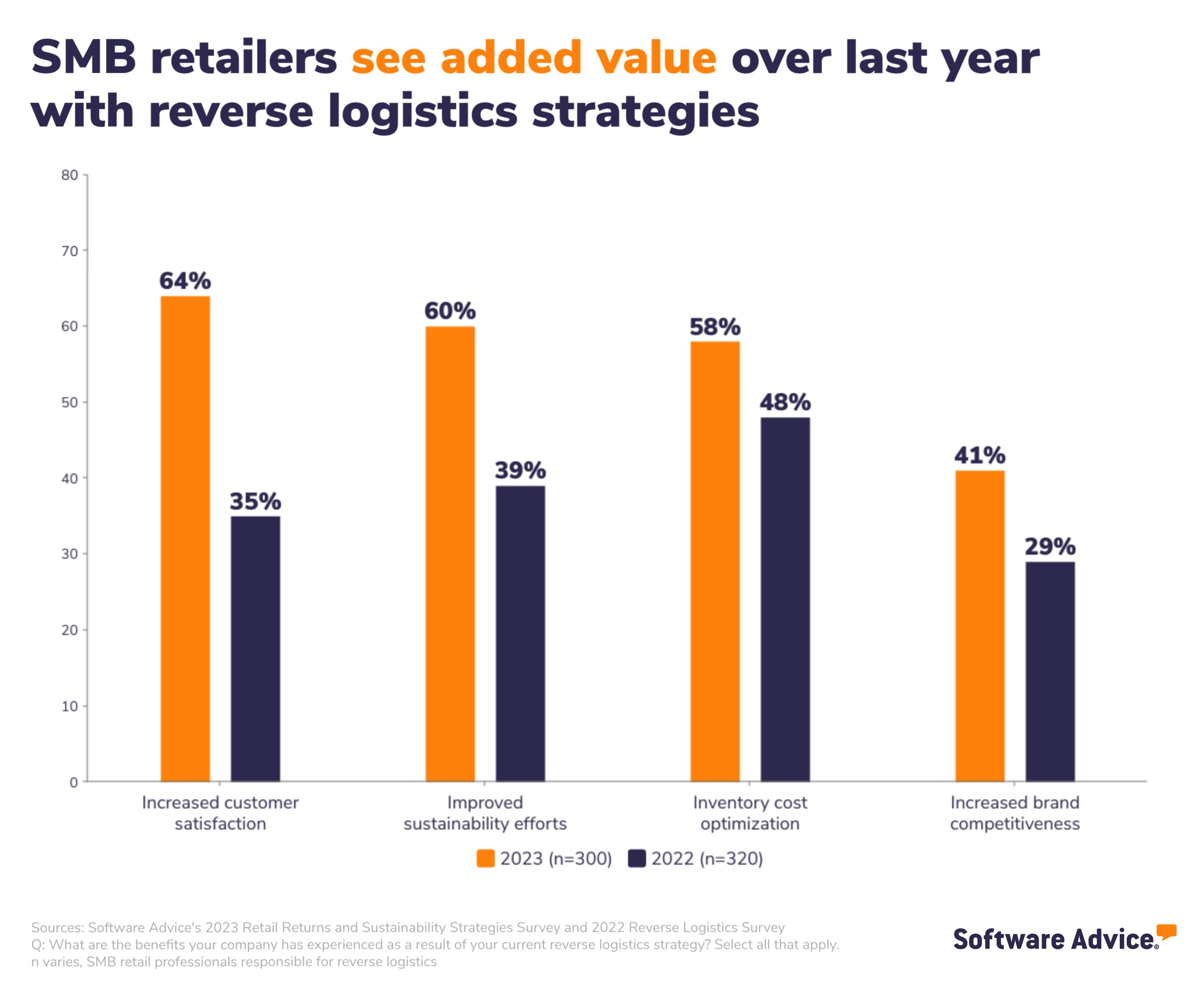
While taking more action and then seeing more benefits is a great result, it’s important to effectively track and manage both these in your software system. This way you can capture and maintain historical data to run reports that help quantify the impact of your strategy.
Recommendation
Invest in technology and data analytics
Technology plays a pivotal role in improving reverse logistics efficiency. Invest in point of sale, inventory management and/or business intelligence software that help you better understand return patterns, reasons, and customer behaviors. With this data, you can refine your processes and reduce return rates.
Retailers focus on logistics and strategic partnerships to improve their reverse logistics sustainability
Retailers are refining their actions taken by making small yet impactful adjustments to their strategies. The adaptations seen in the year-over-year analysis below are driven by goals to reduce environmental impact, lower operational costs, and cater to an increasingly sustainability-focused consumer base.
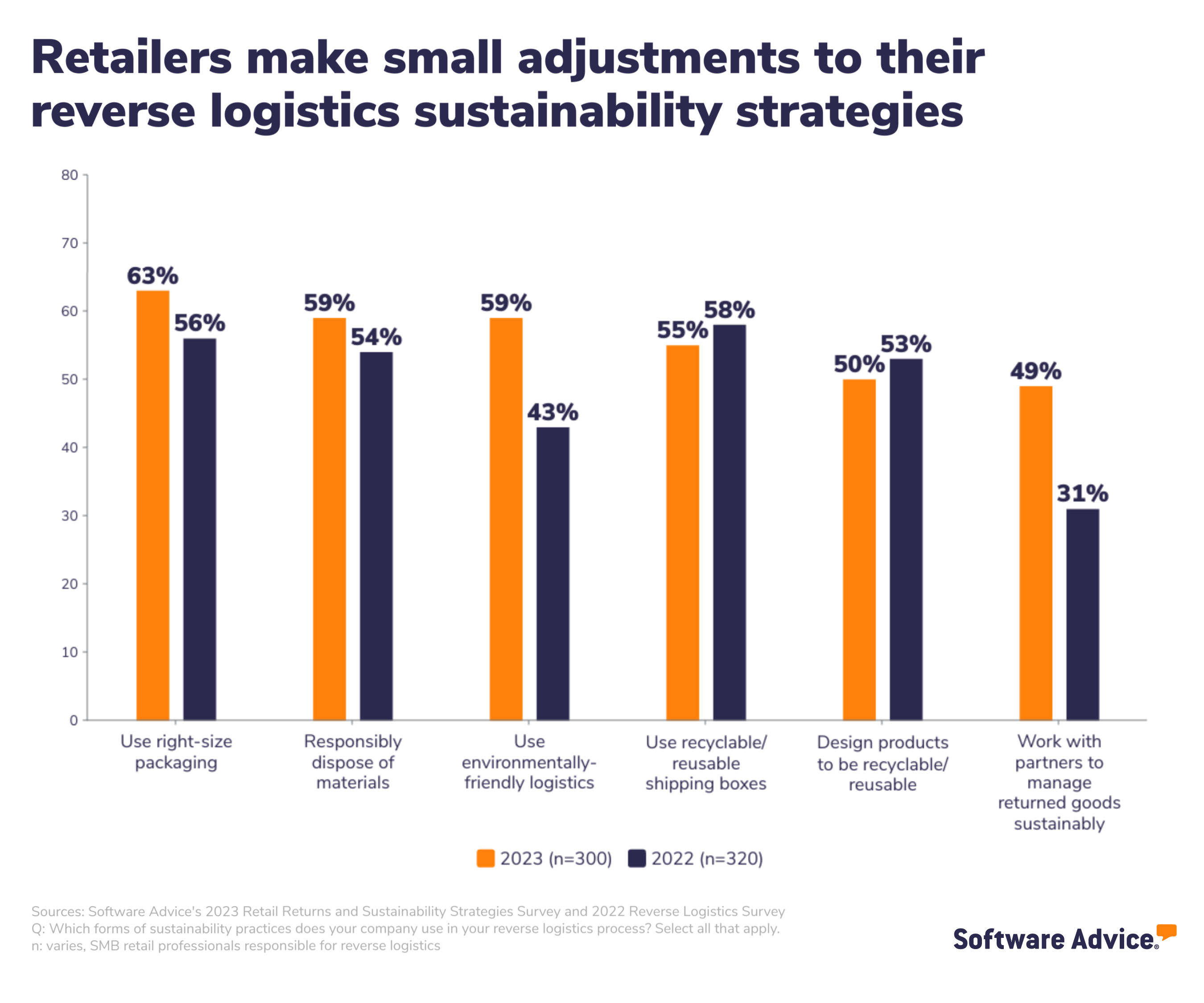
The most notable change is that more retailers are exploring partnerships with third-party experts in the management of product returns to ensure that every facet of their operations adheres to responsible environmental practices. Sustainable packaging is still critical in an effective sustainability strategy, but more retailers are focused on the logistics this year.
Recommendation
Partner with local recycling initiatives
49% of SMB retailers report currently working with third-party partners to manage returned goods sustainably. By doing so, you can limit the environmental impact of unsellable items and contribute to sustainability goals. Form partnerships with local recycling programs or organizations that can help you responsibly dispose of or repurpose returned products.
Effective returns triaging can recoup majority of costs from returned products
Amidst the growing returns challenge, the majority of SMB retailers aren’t focused on preventing returns. Instead, they are finding ways to enhance efficiency by understanding the value of returned items. Smaller retailers are increasingly recognizing that returned products, if triaged** appropriately, can be resold or recycled, reducing waste and recovering some of the lost sale. This shift in perspective offers immense potential for sustainability efforts.
**A triage process for returns includes evaluation of the condition of the item and then determining the best course of action to either resell, refurbish, trash, etc.
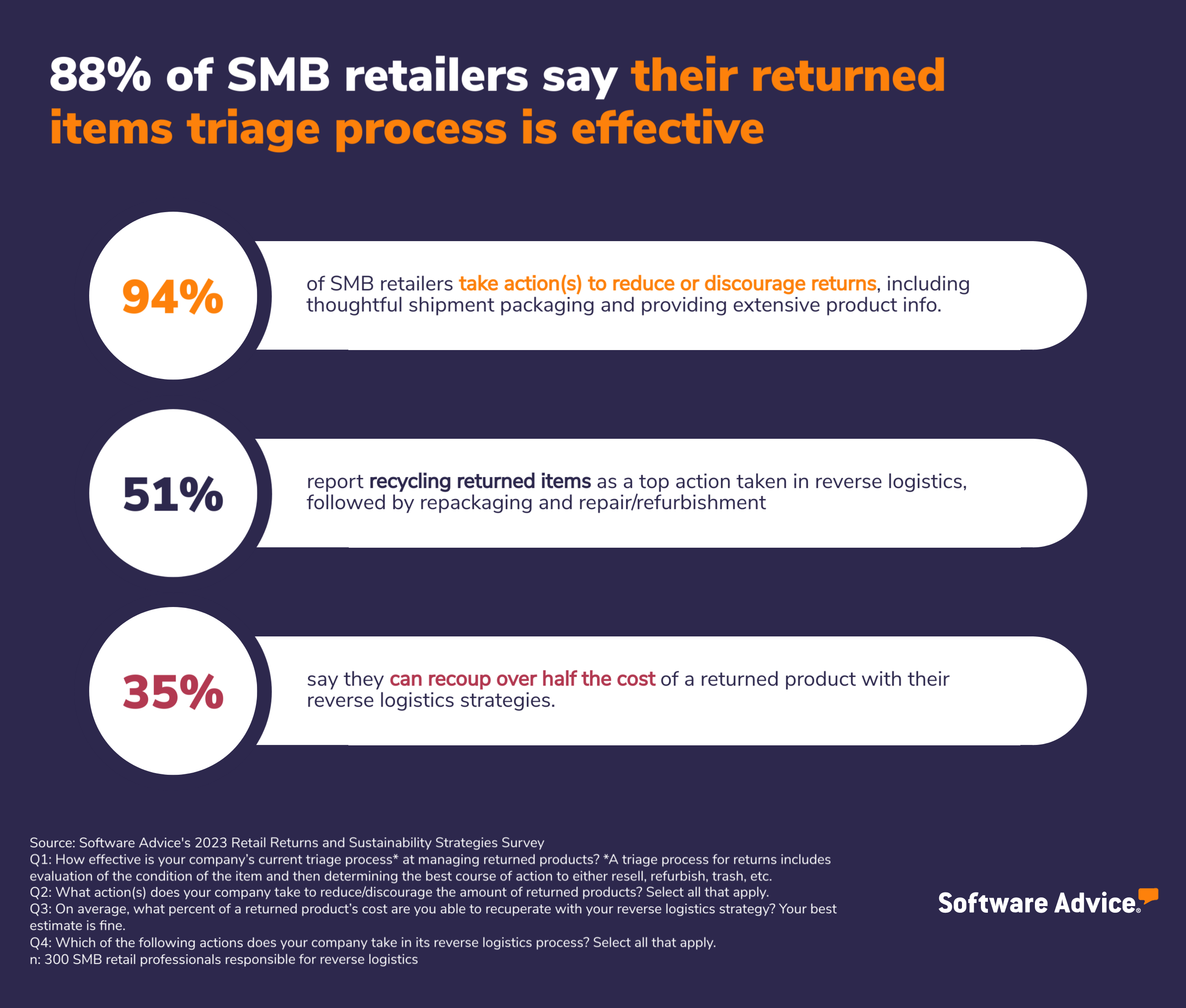
Cost recovery and responsible handling of returned products should be the focus for SMB retailers as the return rates rise but consumer appetite for a circular economy increases as well.
Recommendation
Market your recycled or refurbished products as sustainable options
Highlight the cost savings, emphasizing that resold products are not only budget-friendly but also environmentally responsible, contributing to a sustainable shopping choice. Promote the quality, warranty (if applicable), and your meticulous inspection processes behind resold items to instill confidence in customers.
Dishonest sustainability messaging—or greenwashing—is more prevalent
Unfortunately, our research shows that the number of retail professionals admitting their company’s actions don’t align with the public messaging has increased to 63%, up from 46% in 2022. SMB retailers must avoid greenwashing because it erodes trust and damages their reputation, leading to a loss of credibility and customer loyalty. It diverts resources from genuine sustainability initiatives, missing opportunities for actual environmental improvement. Additionally, greenwashing can have legal consequences.
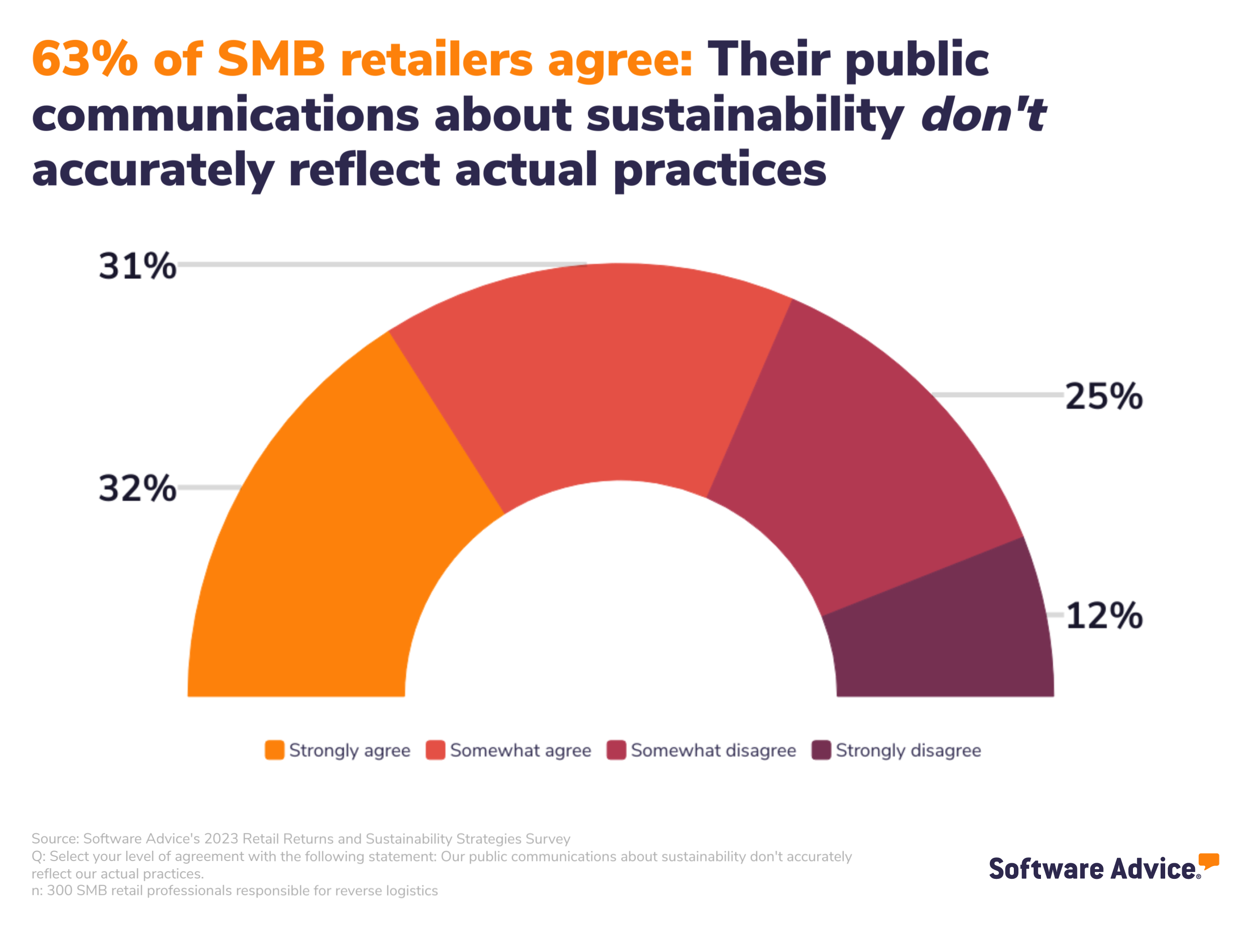
Recommendation
Promote honest and transparent messaging
Retailers should commit to clear, straightforward communication about their sustainability efforts, acknowledging both their successes and challenges. This approach fosters trust with customers, demonstrating a genuine commitment to environmental responsibility and setting the stage for meaningful progress in your sustainability journey.
Embrace sustainability as a guiding principle
By focusing on sustainability in reverse logistics, you can not only recoup costs and improve customer satisfaction, but also contribute to a more environmentally-responsible industry. Here’s a recap of the recommendations shared throughout this report:
Invest in technology and data analytics
Partner with local recycling initiatives
Market your recycled or refurbished products as sustainable options
Promote honest and transparent messaging
Embrace sustainability as a guiding principle and your business should thrive in an increasingly eco-conscious world.
Recommended reading for how to build a more effective supply chain
Nine out of ten SMB retailers feel that larger companies have an advantage over them in their ability to procure inventory. Learn strategies to be more competitive here.
Learn how you can prepare for and mitigate the impact of supply chain disruption, as well as how you can communicate with consumers when disruption has already occurred.
To help make your professional-development decision easier, we review the top current options so you can learn which certifications are worth pursuing.
Survey methodology
Software Advice's 2023 Retail Returns and Sustainability Strategies Survey was conducted in October 2023 among 300 retail professionals at small to midsize businesses who manage product returns to learn about their current challenges and strategies for reverse logistics. Respondents were screened to ensure they are very to extremely involved in the returns and reverse logistics management at their retail company. Respondents were also screened to ensure their business has 1,000 or fewer employees and an annual revenue of $500 million or less.
Software Advice’s 2022 Reverse Logistics Survey was conducted in May 2022 among 320 U.S.-based supply chain and inventory management managers in retail small to midsize businesses. Respondents were screened for size of business (1 - 1,000 employees) and their involvement in returns and reverse logistics management at their retail company (very to extremely involved).